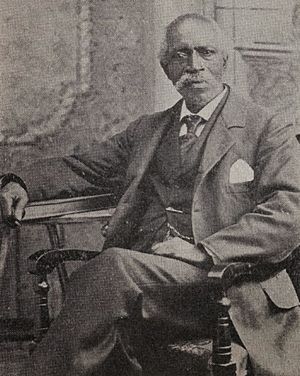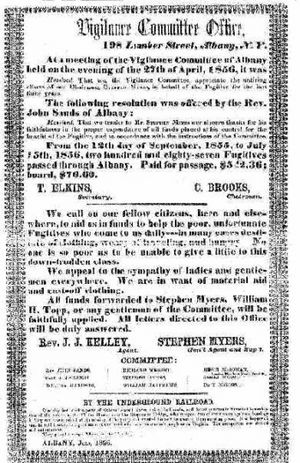Thomas Elkins facts for kids
Thomas Elkins (born in 1818, died August 10, 1900) was an amazing African-American man. He was a dentist, a pharmacist (someone who prepares and sells medicines), and a surgeon (a doctor who performs operations). He was also an inventor and an abolitionist, meaning he worked to end slavery.
Elkins lived most of his life in Albany, New York. He traveled a lot when he worked as a medical examiner for two important army groups, the 54th and 55th Massachusetts infantries. He even visited Liberia, a country in Africa. Some of his cool inventions include better designs for a special toilet (called a chamber commode) and a machine to keep food cold, called a Refrigerating Apparatus.
Contents
Elkins' Career
In the late 1800s, more and more African Americans started working in pharmacies. It was often easier for pharmacists of color to serve other people of color. This was especially true in the Southern United States, where many African Americans lived. Thomas Elkins was one of the first African Americans to become a pharmacist.
He learned about pharmacy from a doctor named Dr. Wynkoop. Elkins worked with him for about ten years. Later, Elkins opened his own small drugstore. It was first on North Swan Street for four years. Then, he moved it to Broadway and Livingston Street, where it stayed open for thirteen more years.
However, due to money problems, he had to close his drugstore. After that, he focused more on dentistry and minor surgeries. He even taught another person, T.H. Sands Pennington, who later had a great career in pharmacy.
Elkins also studied dentistry with Dr. Charles Payne from Albany and Montreal. He learned about surgery from Dr. Marsh, who was also from Albany.
Fighting for Freedom
Thomas Elkins was very involved with the Underground Railroad. This was a secret network that helped enslaved people escape to freedom in Canada. He was a member of the Albany Vigilance Committee. This group helped enslaved people who had escaped and asked people for money to support their cause.
He worked closely with Stephen Myers, who used to be enslaved himself. Stephen and his wife, Harriet, ran what was considered one of the best Underground Railroad stations in New York.
Today, a group called the Underground Railroad History Project owns Elkins' old house at 188 Livingston Avenue. They also own the Myers house and other important buildings from that time.
Elkins was also the leader of a group called the Citizen's Committee. In this role, he gave a special gift to William H. Johnson. This gift showed how much they appreciated Johnson's important work for African Americans.
Civil War and Travels
During the American Civil War (1861–1865), Thomas Elkins played an important role. The governor of Massachusetts, John Andrew, chose him to be a medical examiner. He worked with the 54th and 55th Massachusetts Infantries, which were famous African-American army units.
After the war, Elkins traveled to Liberia. This trip might have been part of the Back to Africa movement. People noticed that he collected many interesting things there. These included valuable seashells, minerals, and other unique items.
Amazing Inventions
Thomas Elkins was a clever inventor. He made improvements to a machine that keeps food from spoiling, called a refrigerating apparatus. This helped people keep their food fresh for longer.
He also patented a better design for a "chamber-commode." This was like an early version of a toilet. His improved design was very fancy! It included many things in one piece of furniture. It had a bureau (a dresser), a mirror, a place for books, a washstand, a table, and a comfy chair.
Another one of his inventions was a piece of furniture that could do three things. It could be a dining table for eating meals. It could also be an ironing table for pressing clothes. And it could even be a quilting frame for making blankets!
Death
Thomas Elkins passed away on August 10, 1900. He is buried in the Albany Rural Cemetery.
Images for kids





